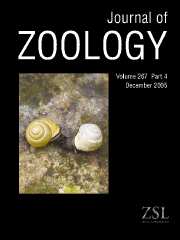Crossref Citations
This article has been cited by the following publications. This list is generated based on data provided by
Crossref.
Hutchinson, John M. C.
and
Waser, Peter M.
2007.
Use, misuse and extensions of “ideal gas” models of animal encounter.
Biological Reviews,
Vol. 82,
Issue. 3,
p.
335.
SIRIPUNKAW, C.
KONGRIT, C.
FARIES, K. M.
MONELLO, R. J.
GOMPPER, M. E.
and
EGGERT, L. S.
2008.
Isolation and characterization of polymorphic microsatellite loci in the raccoon (Procyon lotor).
Molecular Ecology Resources,
Vol. 8,
Issue. 1,
p.
199.
KJÆR, LENE J.
SCHAUBER, ERIC M.
and
NIELSEN, CLAYTON K.
2008.
Spatial and Temporal Analysis of Contact Rates in Female White‐Tailed Deer.
The Journal of Wildlife Management,
Vol. 72,
Issue. 8,
p.
1819.
Clay, Christine A
Lehmer, Erin M
Previtali, Andrea
St. Jeor, Stephen
and
Dearing, M. Denise
2009.
Contact heterogeneity in deer mice: implications for Sin Nombre virus transmission.
Proceedings of the Royal Society B: Biological Sciences,
Vol. 276,
Issue. 1660,
p.
1305.
Martin, Lynn B.
Hopkins, William A.
Mydlarz, Laura D.
and
Rohr, Jason R.
2010.
The effects of anthropogenic global changes on immune functions and disease resistance.
Annals of the New York Academy of Sciences,
Vol. 1195,
Issue. 1,
p.
129.
Monello, Ryan J.
and
Gompper, Matthew E.
2010.
Differential effects of experimental increases in sociality on ectoparasites of free‐ranging raccoons.
Journal of Animal Ecology,
Vol. 79,
Issue. 3,
p.
602.
Craft, Meggan E.
and
Caillaud, Damien
2011.
Network Models: An Underutilized Tool in Wildlife Epidemiology?.
Interdisciplinary Perspectives on Infectious Diseases,
Vol. 2011,
Issue. ,
p.
1.
Navarro-Gonzalez, Nora
Verheyden, Hélène
Hoste, Hervé
Cargnelutti, Bruno
Lourtet, Bruno
Merlet, Joel
Daufresne, Tanguy
Lavín, Santiago
Hewison, A. J. Mark
Morand, Serge
and
Serrano, Emmanuel
2011.
Diet quality and immunocompetence influence parasite load of roe deer in a fragmented landscape.
European Journal of Wildlife Research,
Vol. 57,
Issue. 3,
p.
639.
Monello, Ryan J.
and
Gompper, Matthew E.
2011.
Effects of resource availability and social aggregation on the species richness of raccoon endoparasite infracommunities.
Oikos,
Vol. 120,
Issue. 9,
p.
1427.
Chavez, Deanna J.
LeVan, Ivy K.
Miller, Michael W.
and
Ballweber, Lora R.
2012.
Baylisascaris procyonis in raccoons (Procyon lotor) from eastern Colorado, an area of undefined prevalence.
Veterinary Parasitology,
Vol. 185,
Issue. 2-4,
p.
330.
Smyser, T. J.
Johnson, S. A.
Page, L. K.
Rhodes, O. E.
Acevedo‐Whitehouse, Karina
and
Morando, Mariana
2012.
Synergistic stressors and the dilemma of conservation in a multivariate world: a case study in Allegheny woodrats.
Animal Conservation,
Vol. 15,
Issue. 2,
p.
205.
Navarro-Gonzalez, Nora
Fernández-Llario, Pedro
Pérez-Martín, Juan Enrique
Mentaberre, Gregorio
López-Martín, José M.
Lavín, Santiago
and
Serrano, Emmanuel
2013.
Supplemental feeding drives endoparasite infection in wild boar in Western Spain.
Veterinary Parasitology,
Vol. 196,
Issue. 1-2,
p.
114.
SMYSER, TIMOTHY J.
JOHNSON, SCOTT A.
PAGE, L. KRISTEN
HUDSON, CASSIE M.
and
RHODES, OLIN E.
2013.
Use of Experimental Translocations of Allegheny Woodrat to Decipher Causal Agents of Decline.
Conservation Biology,
Vol. 27,
Issue. 4,
p.
752.
Kristen Page, L.
2013.
Parasites and the conservation of small populations: The case of Baylisascaris procyonis.
International Journal for Parasitology: Parasites and Wildlife,
Vol. 2,
Issue. ,
p.
203.
Hirsch, Ben T.
Prange, Suzanne
Hauver, Stephanie A.
and
Gehrt, Stanley D.
2013.
Genetic relatedness does not predict racoon social network structure.
Animal Behaviour,
Vol. 85,
Issue. 2,
p.
463.
Hirsch, Ben T.
Prange, Suzanne
Hauver, Stephanie A.
Gehrt, Stanley D.
and
Khudyakov, Yury E.
2013.
Raccoon Social Networks and the Potential for Disease Transmission.
PLoS ONE,
Vol. 8,
Issue. 10,
p.
e75830.
Jardine, Claire M.
Pearl, David L.
Puskas, Kirstie
Campbell, Doug G.
Shirose, Lenny
and
Peregrine, Andrew S.
2014.
THE IMPACT OF LAND USE, SEASON, AGE, AND SEX ON THE PREVALENCE AND INTENSITY OFBAYLISASCARIS PROCYONISINFECTIONS IN RACCOONS (PROCYON LOTOR) FROM ONTARIO, CANADA.
Journal of Wildlife Diseases,
Vol. 50,
Issue. 4,
p.
784.
Pipas, Michael J.
Page, L. Kristen
and
Kazacos, Kevin R.
2014.
SURVEILLANCE FORBAYLISASCARIS PROCYONISIN RACCOONS (PROCYON LOTOR) FROM WYOMING, USA.
Journal of Wildlife Diseases,
Vol. 50,
Issue. 4,
p.
777.
Vander Wal, Eric
Garant, Dany
Calmé, Sophie
Chapman, Colin A.
Festa‐Bianchet, Marco
Millien, Virginie
Rioux‐Paquette, Sébastien
and
Pelletier, Fanie
2014.
Applying evolutionary concepts to wildlife disease ecology and management.
Evolutionary Applications,
Vol. 7,
Issue. 7,
p.
856.
Aalto, Sanni L.
Decaestecker, Ellen
and
Pulkkinen, Katja
2015.
A three-way perspective of stoichiometric changes on host–parasite interactions.
Trends in Parasitology,
Vol. 31,
Issue. 7,
p.
333.




